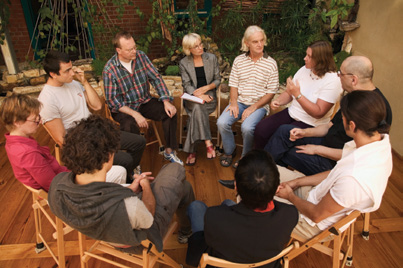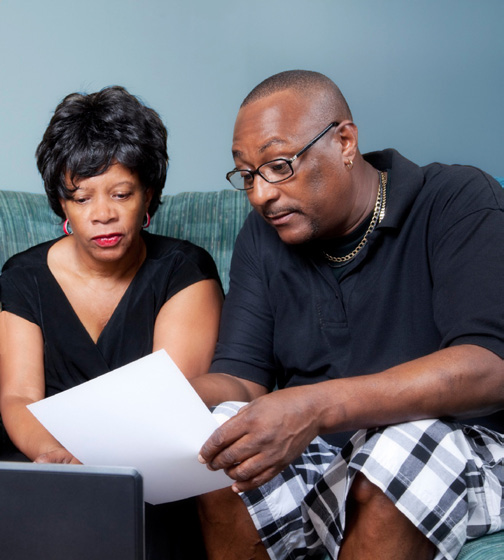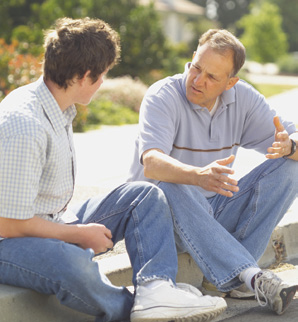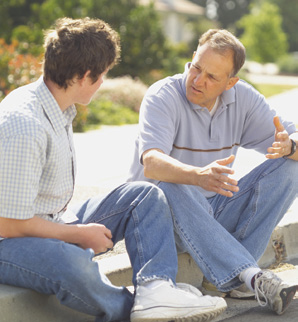have a hard time coping with your cancer.
or the cartoons and quotes in
This can make you feel real y alone.
magazines.
■
Look in the humor section in the
Although some days may be harder than
library or book store.
others, remember that you aren’t alone. Keep
doing the things you’ve always done the best
you can. If you want to, tell people that you
don’t want to be alone. Let them know that
you welcome their visits.
More than likely, your loved ones are feeling
many of the same things you are. They, too,
may feel cut off from you if they can’t talk
with you. You may also want to try joining
a support group. There you can talk with
others who share your feelings.
27



About Support Groups
Getting Support
You may have heard about
support groups in your area for
people with cancer. They can
meet in person, by phone, or
over the Internet. They may help
you gain new insights into what’s
happening, get ideas about how
to cope, and help you know that
you’re not alone.
Your feelings will come and go, just as they always have in
In a support group, people may
your life. It helps to have some strategies to deal with them.
talk about their feelings and what
they have gone through. They may
First, know that you aren’t alone. Many people have been
trade advice and try to help others
in your situation. Some choose to confide in friends and
who are dealing with the same
family members. Others do better when they join a support
kinds of issues. Some people like
group. It helps them to talk with others who are facing the
to go and just listen. Others prefer
same challenges. You may prefer to join an online support
not to join support groups at all.
group, so you can chat with people from your home.
Some people aren’t comfortable
If support groups don’t appeal to you, there are many
with this kind of sharing.
experts who are trained to work in cancer care. These
include oncology social workers, health psychologists, If you feel like you would enjoy
or counselors.
outside support such as this,
but can’t get to a group in your
Many people also find faith as their source of support. They area, try a support group on the
may seek comfort from the different members of their faith
Internet. Some people with cancer
community. Or they may find that talking to a leader in
say that Websites with support
their religious or spiritual community can be helpful. If you groups have helped them a lot.
need help finding faith-based support, many hospitals have
a staff chaplain who can give support to people of all faiths and religions. Your health care team may also be able to tell you about faith-based organizations in the area.
Ways You Can Cope
You may be able to keep doing many of your regular
activities, even though some may be harder to do. Just
remember to save your strength for the things you real y
want to do. Don’t plan too many events for one day. Also,
try to stagger things throughout the day.
On the next page you’ll find some ideas that other patients
say have helped them cope. As you can see, even little
things can help.
28







Build model airplanes.
Pray or meditate.
Ways You
Window shop.
People watch at the mall.
Can Cope
Go to a movie.
Play board games or cards.
Attend local concerts and plays.
Start a new daily routine.
Accept that it may have to be
different from your old one,
I’m taking a watercolor class. I’m awful at it, but I sure
but change is okay!
don’t care – anything that gets my mind off things.
Talk about feelings with
I like to get my nails done.
friends, family, or a leader
I started to follow the stock market.
in your spiritual or faith
community.
My nieces call and leave messages or songs on my
answering machine. I listen to them when I need a
Do yoga or gentle stretching.
fast way of cheering up.
Sometimes I drive out to the airport and watch planes.
For some reason, it’s very soothing to me.
I built a birdhouse with
my grandson. We had fun,
Spend time outdoors in a community garden or park.
and I loved teaching him
about tools.
Volunteer or find a way to help others in need.
I like to bird watch. I sit
Plant flower pots.
on my porch with a pair
Go to worship services.
of binoculars.
Knit, crochet, or needlepoint.
I watch a lot of movies.
Do crossword puzzles.
I like to fix things around
Do relaxation exercises.
the house.
I took up photography.
Go fishing.
I didn’t buy a fancy
camera or anything. I just
Do the things I enjoy, like making phone calls or reading.
started taking pictures.
Spend time with people I love.
Listen to music or a relaxation tape.
Do woodcarving.
29
Read mystery novels.

“Don’t feel like you’re being
morbid because you’re taking
care of business in advance. My
goal is to try not to leave things
undone because it’s not going to
be any easier on anybody else.”
—Ronald
30

C H A P T E R 6
Advance Planning
This section outlines some things you can do to ensure your wishes are understood. This can help relieve the burden on your loved ones later.
Advance Directives
It’s important to start talking about your wishes with the people who matter most to you.
There may come a time when you can’t tell your health care team what you need. Some people prefer to let their doctor or their family members make decisions for them. But often people with cancer feel better once they have made their desires known.
Advance directives are legal papers that tell your loved ones and doctors what to do if you can’t tell them yourself. The papers let you decide ahead of time how you want to be treated.
They may include a living will and a durable power of attorney for health care. Think about giving someone you trust the right to make medical decisions for you. This is one of the most important things you can do.
A living will lets people know what kind of medical care you want if you are terminal y ill (dying). It states in writing your wishes about being kept alive by artificial means or extreme measures (such as a breathing machine or feeding tube). Some states allow you to give other instructions as wel .
A durable power of attorney for health care names a person to make medical decisions for you when you can’t make them yourself. (In some places, you can appoint this person to make decisions when you no longer want to.) This person is called a health care proxy.
Choose a person you can trust to carry out your decisions and follow your preferences. Be sure to discuss this in-depth with the person you choose. They need to know they could be called upon. They should understand your wishes and any religious concerns you have.
Setting up an advance directive is not the same as giving up. Making decisions now keeps you in control. You are making your wishes known for all to follow. This can help you worry less about the future and live each day to the fullest.
It’s hard to talk about these issues. But it often comforts family members to know what you want. And it saves them having to bring up the subject themselves. You may also gain peace of mind. You are making hard choices for yourself instead of leaving them to your loved ones.
Make copies of your advance directives. Give them to your family members, your health care team, and your hospital medical records department. This will ensure that everyone knows your decisions.
31



Following State Laws
Other Legal Papers
You do not always need a
Here are some other legal
lawyer present to fill out these
papers that are not part of
documents. But you may need a
the advance directives:
notary public. Each state has its
■
A will divides your
own laws concerning living wills
property among
and durable powers of attorney.
your heirs.
These laws can vary in important
details. In some states, a living
■
A trust is when a person
will or durable power of attorney
you appoint oversees,
signed in another state isn’t legal.
invests, or pays out
Talk with your lawyer or social
money to those named in the trust.
worker to get more details.
■
Legal power of attorney—you appoint a person
to make financial decisions for you when you can’t
Or look at your state’s
make them yourself.
government website. (See the
Resources section at the end of
the booklet for more on how to
Planning for Your Family
get copies of advance directives.)
Careful planning reduces the financial, legal, and
emotional burden your family and friends will face
after you’re gone. For many people, it’s hard bringing up
these subjects. But talking about them now can avoid
problems later.
Maybe you don’t feel comfortable bringing up the
subject with loved ones. Or maybe your family simply
doesn’t talk about these things. In either case, seek help
from a member of your health care team. They may be
able to help your family understand.
■
Clearing up insurance issues. Contact your
health insurance company if you decide to try a new
treatment or go into hospice. Most insurance plans
cover hospice. They also cover brief home visits
from a nurse or a home health aide several times
a week. But it’s wise to ask in advance. This may
prevent payment problems later.
32



■
Putting your affairs in order. You can help your
A Checklist for
family by organizing records, insurance policies,
Organizing Your Affairs
documents, and instructions. You may want to call
your bank to make sure you have taken all the right
✔ If you can’t physically gather
steps in doing these things. On the next page is a
important papers, make a
checklist to share with the person who will help you
list of where your family can
manage your affairs. (Also see the Personal Affairs
find them.
Worksheet on page 50.)
✔ Keep your papers in a
■
Making funeral arrangements. You may want to
help your family plan a funeral or memorial service
fireproof box or with
that has your personal touch. Some people plan
your lawyer.
services that are celebrations. Talk with your family
about how you want others to remember you.
✔ If you keep your important
papers in a safety deposit
box, make sure that a family
member or friend has access
to the box.
✔ Although original
documents are needed for
legal purposes, give family
members photocopies.
A worksheet of important
papers and documents is on
page 50. You can use it as a
guide to the types of papers
your family will need.
33

“I went to the Grand Canyon
with my brother. I started crying
and couldn’t stop. I realized he
started crying, too, because he
couldn’t handle the fact that he
may not have me around any
more. So there we were, just
crying in the car. He was like,
‘I don’t want to lose you. I don’t
want you to die.’” —Rhonda
34

C H A P T E R 7
Talking With the Special People in Your Life
Your loved ones may need time to adjust to the new stage of your illness. They need to come to terms with their own feelings. These may include confusion, shock, helplessness, or anger.
Let them know that they can offer comfort just by being themselves and by being at ease with you. Ask them to listen when you need it, rather than try to solve every problem.
Knowing that people cope with bad news in their own way will help you and your loved ones deal with their emotions. Many people are reassured and comforted by sharing feelings and taking the time to say what they need to.
Bear in mind that not everyone can handle the thought that they might lose you. Or some people may not know what to say or do for you. As a result, relationships may change. This isn’t because of you, but because others have trouble coping with their own painful feelings.
If you can, remind them that you are still the same person you always were. Let them know if it’s all right to ask questions or tell you how they feel. Sometimes just reminding them to be there for you is enough. But it’s also okay if you don’t feel comfortable talking about it either. Sometimes certain topics are hard to talk about with others. If this is the case, you may want to talk by yourself with a member of your medical team or a trained counselor. You also may want to attend a support group where people meet to share common concerns.
Some families have trouble expressing their needs to each other. Other families simply do not get along with each other.
If you don’t feel comfortable talking with family members, ask a member of your health care team to help. You could also ask a social worker or other professional to hold a family meeting. This may help family members feel safer to express their feelings openly. It can also be a time for you and your family to meet with your team to problem-solve and set goals.
It can be very hard to talk about these things. But studies show that cancer care goes more smoothly when everyone stays open and talks about the issues.
Often, talking with the people closest to you is harder than talking with anyone else. Here’s some advice on talking with loved ones during tough times.
35

Spouses and Partners
Some relationships grow stronger during cancer treatment, but others are weakened. It’s very common for patients and their partners to feel more stress than usual as a couple.
There is often stress about:
■
Knowing how to give and get support
■
Coping with new feelings that have come up
■
Figuring out how to communicate
■
Having money problems
■
Making decisions
■
Changing roles
■
Having changes in social life
■
Coping with changes in daily routines
Some people feel more comfortable talking about serious issues than others. Only you and your loved one know how you communicate. Some things to think about are:
■
Talk things over. This may be hard for you or your partner. If so, ask a counselor or social worker to talk to both of you together.
■
Be realistic about demands. Your spouse or partner may feel guilty about your illness.
They may feel guilty about any time spent away from you. They also may be under stress due to changing family roles.
■
Spend some time apart. Your partner needs time to address his or her own needs.
If these needs are neglected, your loved one may have less energy and support to give.
Remember, you didn’t spend 24 hours a day together before you got sick.
■
Know that it’s normal for body changes and emotional concerns to affect your sex life. Talking openly and honestly is key. But if you can’t talk about these issues, you might want to talk with a professional. Don’t be afraid to seek help or advice if you need it.
“My wife has been my biggest source of strength, plain and simple. That’s how I cope with all of it, because we talk and sometimes we literally are talking until 4 or 5 in the morning. We are just sitting here and just talking and reminiscing, and asking questions and answering them. Being there for one another.” —Steve
36





Small Children
“We can’t always protect the people we love. But we can prepare them.”
—Unknown
Keeping your children’s and grandchildren’s trust is
still very important at this time. Children can sense
when things are wrong. It’s best to be as open as you
can about your cancer. They may worry that they did
something to cause the cancer. They may be afraid
that no one will take care of them. They may also feel
that you are not spending as much time with them as
you used to. Although you can’t protect them from
what they may feel, you can prepare them.
Some children become very clingy. Others get into trouble in school or at home. Let the teacher or guidance counselor know what is going on. And with your kids, it helps to keep the lines of communication open. Try to:
■
Be honest. Tell them you are sick and that the doctors are working to help you feel comfortable.
■
Let them know that nothing they did or said caused the cancer. And make sure they know that they can’t catch it from others.
■
Tell them you love them.
■
Tell them it’s okay to be upset, angry, or scared. Encourage them to talk.
■
Be clear and simple, since children do not have the focus of adults. Use words they can understand.
■
Let them know that they will be taken care of and loved.
■
Let them know that it’s okay to ask questions. Tell them you will answer them as honestly as you can. In fact, children who aren’t told the truth about an illness can become even more scared. They often use their imagination and fears to explain the changes around them.
Teenagers
“My father and I are so much closer. It’s a totally different family than we were before I was diagnosed. We’ve learned how to talk about how we feel, how to talk to each other about what’s going on and what we’re afraid of.”
—Jake
37





Many of the things listed above also apply to teenagers.
They need to hear the truth about an illness. This helps
keep them from feeling guilt and stress. But be aware
that they may try to avoid the subject. They may become
angry, act out, or get into trouble as a way of coping.
Others simply withdraw. Try to:
■
Give teenagers the space they need. This is especial y
important if you rely on them more than before to
help with family needs.
■
Give them time to deal with their feelings, alone or
with friends.
■
Let your teenager know that they should still go to school and take part in sports and other fun activities.
If you have trouble explaining your illness, you might want to ask for help. Try asking a close friend, relative, or health care provider for advice. You could also go to a trusted coach, teacher, or youth minister. Your social worker or doctor can help you find a good counselor.
Adult Children
Your relationship with your adult children may change now that you have advanced cancer.
You may have to rely on them more for different needs. It may be hard for you to ask for support. After al , you may be used to giving support rather than getting it. Or it may be hard for other reasons; perhaps your relationship with them has been distant.
Adult children have their concerns, too. They may become fearful of their own mortality.
They may feel guilty because they feel that they can’t meet the many demands on their lives as parents, children, and employees.
As your illness progresses, it helps to:
■
Share decision-making with your children.
■
Involve them in issues that are important to you. These may include treatment choices, plans for the future, or types of activities you want to continue.
Reaching out to your children and openly sharing your feelings, goals, and wishes may help them cope with your disease. It may also help lessen fears and conflict between siblings when other important decisions need to be made.
“It’s a roller coaster ride, so we just ride the roller coaster. I’ve got the whole family prepared, and that’s what you have to do when you have cancer. Things are going well and then really bad.” —Delia
38

C H A P T E R 8
Looking for Meaning
Many people who have advanced cancer look more deeply for meaning in their lives. They want to und



































